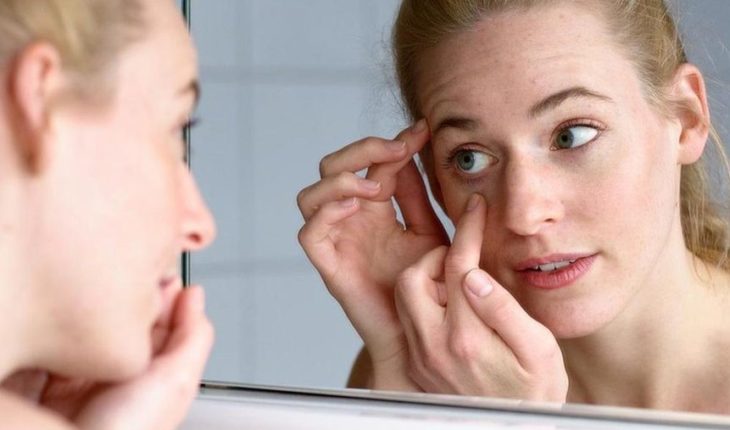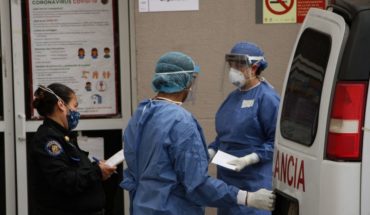was a day sunny outside and the air had a touch of spring. I followed Angela, to whom we have changed the name to protect his identity, down the Hall to my office in Melbourne, Australia.
It had been my patient for several years, but that was the morning that I count that dragged the feet a little as he walked. His facial expression seemed a little out of tone and I noticed that he had a slight tremor.
I sent her to a neurologist and in one week he began treatment for Parkinson’s, but I felt badly for not having detected before their symptoms.
Unfortunately, this situation is repeated with patients from all over the world.
They are only diagnosed when they begin to show notable disease signs, when the body emits warning signs that something is wrong.
If they could be detected before, patients would have the opportunity to begin treatment in the early stages, even with the possibility to stop the disease before it develops.
And new technologies are starting to offer some hope in this regard.
Face2gene/FDNANuestras facial features can reveal subtle information about certain rare genetic disorders. With the help of artificial intelligence, patients and physicians can meet possible changes in your health months before, or even years, of which symptoms appear.
The Futurist Ross Dawson, founder of Future Exploration Network, predicts that in the next few years we will witness a change from the current model of “disease care” to a new ecosystem of health care, centered more on prevention and monitoring of possible health problems until they develop.
“The change in the attitude of the society, which now has higher expectations of lead full and healthy lives is driving these changes,” he says.
“In the past decade, the explosion of new technologies and algorithms allowed artificial intelligence have an in-depth knowledge that has become far more effective in pattern recognition that humans have”.
By taking advantage of the artificial intelligence to monitor our heart rate, our breath, our movements and even chemical substances present in our breath, the technology can detect potential problems of health at the individual level long before obvious symptoms appear.
This could help doctors or allow patients to change their lifestyle to relieve or prevent diseases.
Perhaps the most interesting is that these systems can be differentiated patterns that are invisible to the human eye, revealing surprising aspects about our future health.
A look at your health Dawson mentioned, for example, studies in which intelligence artificial is able to anticipate potential heart attacks to the people most likely to suffer them through the constant monitoring of your heart rate.
One study even found variables that cardiologists had not given predictive value.
Getty ImagesLos patterns of blood vessels in the retina of the eye can help to reveal if a person has risk of suffering a heart attack. Another recent study by researchers at Google showed that artificial intelligence algorithms also could be used to predict whether someone is going to suffer a heart attack look him in the eye.
The team showed to an artificial intelligence program 284.335 patients retina scanners. Machine learned to detect the telltale signs of cardiovascular disease looking eye blood vessels.
Daily movements if Dina Katabi comes out with theirs, the delays in the diagnosis of genetic disorders and diseases like Parkinson’s, depression, emphysema, heart problems or dementia will be a thing of the past.
She is responsible for the design of a device that transmits wireless signals of low power in a House. These electromagnetic waves take data from a patient’s body.
Whenever we move, we change the electromagnetic field that surrounds us.
Katabi device detects these reflections and tracks them, using machine learning to follow the movements of a patient through the walls.
Katabi describes wireless signals as “incredible beasts” that go beyond our natural senses.
The implementation of a device in a patient’s home allow that their sleep patterns, mobility and mode of walking are monitored constantly.
You can register your breathing rate, even with several people in a room, and monitor your heartbeat, or provide information about their emotional state.
“We do not see them, but they can complement our knowledge in an almost magical way,” she says.
“Our new device is able to pass through walls and extract vital information that can increase our limited ability to perceive the changes.”
This ability to find changes in the daily behavior of patients can provide early clues that something is wrong, perhaps even before they themselves know it.
Many of us already use a variety of devices to auto-monitorear our constants, since the intake of calories to the number of steps we take each day.
Artificial intelligence can play a vital role to help make sense of all this information.
This ability to predict changes in health could be particularly important as our population ages.
According to United Nations, persons over 60 years will represent one fifth of the world’s population for the year 2050.
The way in which we look to help predict future diseases could also be used by the artificial intelligence face value.
A recent study suggests that subtle differences in our face could be the characteristics of a particular disease.
Getty ImagesYa use many devices that record steps, heart rate or sugar levels. FDNA, a startup based in the U.S. city of Boston, has developed an application called Face2Gene that uses something called “deep phenotyping” to identify possible genetic diseases from facial features of a patient.
It uses a technique of artificial intelligence known as deep learning, which teaches its algorithms to detect traits and facial shapes that commonly found in rare genetic disorders such as Noonan syndrome.
The algorithm is trained with more than 17,000 photographs of patients affected by genetic conditions different 216.
In some of these disorders, patients develop certain facial characteristics of his illness, as in the intellectual disability of type Bain, where children have characteristic eyes in the form of almond and small Chin.
FDNA algorithm has learned to recognize these distinctive facial patterns that often are undetectable to the doctors.
Inside your brain since rare diseases affect about 10% of the world population, you are likely to tools of artificial intelligence like this medicine.
However, not all diseases are obvious to identify from the outside.
Getty ImagesLos doctors rarely detect diseases in patients without symptoms, but artificial intelligence technology could allow them to treat problems before. Physicians and surgeons have relied for a long time on radiographs and the scanner to diagnose the cause of symptoms presenting in their patients.
But what if it were possible to use these tests to detect a disease before it starts to reveal symptoms?
Ben Franc is not an ordinary radiologist.
Professor of clinical radiology of the University of Stanford, United States, has launched a project to find the hidden secrets in millions of PET scans of entire body carried out routinely every year in any Department of Oncology .
Subtle changes Franc works with a team to study whether changes can be used in brain metabolism that appear in these PET scans.
You want to predict whether someone might develop Alzheimer’s disease, a condition that affects 10% of people over 65 years.
Using artificial intelligence have developed algorithms that are able to detect these subtle changes in metabolism, in this case, the consumption of glucose in certain areas of the brain that is believed to occur at an early stage of the development of the disease of Alzheimer’s disease.
Getty ImagesAl looking for subtle changes in the metabolism of the brain from medical examinations, intelligence could help diagnose disease Alzheimer.Pero years earlier is not just Alzheimer’s disease.
Automatic learning offers new ways to detect early disease of mental health to discover hidden signals in the choice of words, tone of voice and other nuances of the language of a person.
Ellie, a digital avatar developed by the Institute of technology creative of the University of Southern California, can analyze more than 60 points in the face of a patient to determine if you might be depressed, anxious or suffering from stress disorder post-traumatic.
The time it takes for a person before answering a question, his position or how much nods, gives Ellie tracks on the mental state of the patient during the ‘consultation’.
Expected that this way of using machine learning generates important advances on psychiatric outcomes “improving the prediction, diagnosis and treatment of mental illness”, wrote Nicole Martinez-Martin with his colleagues of the School of Stanford biomedical ethics in a recent article.
Difficult decisions when you combine all these individual biometric measurements with the genetic profile, the result could allow the prediction of individual risk factors that would replace today’s extended medical guidelines.
USC Institute for Creative TechnologiesUn virtual therapist analyses the body language and the tone of voice used by patients who can identify signs of depression. In the world of precision medicine, artificial intelligence could make annual medical checkup as anachronistic.
But how much confidence we are willing to put in an algorithm when it comes to our lives?
A recent article in the journal of ethics of the American Medical Association presents a scenario in which automatic learning is used to make decisions to predict the end of a patient’s life.
The authors point out that “an algorithm will not lose sleep if it predicts with a high degree of confidence that a person would go off a life support machine”.
The question is: do we want something that don’t worry about decisions made at such times?
When we fall sick we could prefer to have on our side a doctor instead of a machine, but in the near future a physician of artificial intelligence might be able to detect problems much earlier than its organic counterpart.
To be perfectly adapted to our individual personalities, behaviors and emotions, may give us an early warning that could save our lives.
So although hopefully not a computer feels beside us on the bed, it is reasonable to want to understand what and how we feel.
You can read the original version of this story in English at BBC Future.
Now you can receive notifications of BBC world. Download the new version of our app and activate them so you don’t miss our best content.
Thanks for reading! Help us to continue with our work. How? You can now subscribe to political Animal on Facebook. With your monthly donation, you will receive special content. Find out how to subscribe here. Check our list of frequently asked questions here.
translated from Spanish: Signals that alert about your future health problems
February 12, 2019 |





